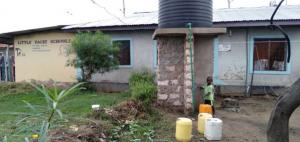International
So many projects

There are so many projects available for Rotary Clubs to support internationally, it is not possible to support them all.
However, End Polio Now is Rotary's No. 1 priority - our promise to the children of the world. And The Rotary Club of Rushden Chichele are pleased to continue supporting this campaign annually.
 The problem
The problem
While only older people remember children in callipers with flaccid legs (‘infantile paralysis’) and adults in ‘iron lungs’, it is a depressing reality that unless polio is eradicated globally, a return of such horrors may be only a flight away!
Poliomyelitis is not hereditary. It results from poor hygiene and bad sanitation. Of the original three strains, each needing a specific vaccine, P1 is the only one now left in the environment although circulating vaccine derived polio is an increasing threat across Africa in particular but anywhere with a poorly vaccinated population is at risk. The polio virus enters children’s bodies though contaminated food or water – the faeco-oral route – and multiplies in the throat or intestine. From there it passes into the blood stream or sometimes the nervous system, causing paralysis by destroying the nerve cells, which cannot regenerate. Over 99% of children have only a mild form of fever and body ache, which may go undetected as the polio virus infection; fewer than 1% of them develop acute flaccid paralysis.
Infected children excrete the virus in the faeces, which can infect unimmunised children. The motivation for Rotary’s polio campaign stemmed from the eradication of smallpox, which like polio was a viral disease for which vaccines already existed. Unlike smallpox, polio viruses can survive for long periods outside a human host, especially in sewage.
The solution
Improvements in health and the provision of sanitation and clean water would offer huge advances, but the strategy to eradicate polio was to carry out vaccination on a global scale.
In 1985, Rotary International, the world’s largest service organisation, announced a plan to eradicate polio by vaccinating every at-risk child under five, and has since contributed over $1.8 billion to implement this plan*. In 1988, the World Health Organisation, UNICEF and the US Centers for Disease Control and Prevention joined Rotary to launch the Global Polio Eradication Initiative.
In 2007 the Gates Foundation became a major supporter by donating £62.5 million ($100 million) directly to Rotary, and in 2009 donated a further £160 million ($255 million). Rotary has agreed to raise $150 million in matching funds during the current funding period to 2023.
In the United Kingdom babies are vaccinated at the ages of six weeks, 10 weeks and 15 weeks, followed by a booster at 18 months. In countries where diarrhoea is common because of waterborne infections, children need far more doses to achieve the same immunity. So the solution to the problem has necessitated an immense effort on an unprecedented scale.
The vaccination process is simple. One person squeezes two drops of the oral polio vaccine (OPV) from a plastic vial on to the tongue of a child and one uses an indelible pen to mark the child’s finger – a purple pinkie – to indicate they have been vaccinated. This takes only a few seconds and costs about 50p (80 cents).
As a result of this long-term strategy the number of polio cases has dropped by over 99% since 1988, from about 350,000 cases annually in 125 endemic countries to a very small number in 2020 in only two countries: Afghanistan and Pakistan. On 24 October 2019 Nigeria marked three full calendar years without a single case.
However, the onset of the COVID-19 pandemic threatens to cause great damage to the worldwide campaign against polio due the cessation of routine door-to-door vaccinations and the diversion of GPEI assets to the campaign against COVID-19.
The strategy
Routine immunisation is essential because it is the main way that polio-free countries protect their children from the threat of imported polio. The strategy is to administer four doses of polio vaccine to every child before their first birthday, then a dose on a specific day each year until their fifth birthday.
National Immunisation Days (NIDs) are set by governments as a critical eradication strategy. Rotary’s PolioPlus program has been one of the driving forces behind NIDs. To appreciate the scale of a typical NID, as many as 170 million children are immunised in a single day in India. The job of Rotarians and health workers is to dispense two drops of vaccine onto the tongues of as many children as they can find on that day.
Surveillance by health workers, assisted by Rotarians, plays an important role in finding, reporting, and investigating cases of acute flaccid paralysis, ideally within 48 hours of onset. Surveillance also identifies environmental samples carrying the virus for further investigation.
Targeted mop-up campaigns usually follow NIDs but are smaller operations, often requiring house-to-house visits to ensure that as few children as possible have missed being immunised.

